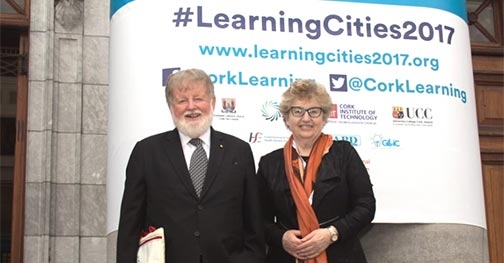The learning city concept can contribute greatly to lifelong learning objectives within a community (rural area, neighbourhood, city or region). However, it must be well planned, engage stakeholders from across different sectors and most importantly provide a mechanism for monitoring progress.
I define lifelong learning using the PASCAL definition[1] ‘structured, purposeful learning throughout the lifespan, from cradle to grave’. This links with the UNESCO definition of a Learning City[2], which feature the mobilization of resources for some broad goals to do with individual empowerment, economic and cultural prosperity, social cohesion and sustainable development. The resources include formal education, workplace learning, community and family learning, technology, ensuring a quality experience while developing a culture of learning within a community.
I think that lifelong learning is the driver for change in a community. I have found that the learning city concept works best when communities come together to deal with tricky economic and social issues. For example, low levels of educational attainment, low-income levels, or an absence of employment opportunities in a community. In my experience, it is difficult to mobilise learning city resources to achieve lifelong learning goals without a plan.
My colleagues and I wrote about how three communities, over a period of more than 10 years, planned, engaged their stakeholders and evaluated their learning city work. The case studies include two city locations on the outskirts of Melbourne, Victoria and a learning community in rural New South Wales in Australia (Wheeler & Wong, 2013, Wheeler, Wong & Blunden 2014a, Wheeler, Wong & Blunden 2014).
It is the systematic accumulation of documented knowledge – the small successes, the programs, awards, recognitions that count towards long-term outcomes. If you have a collective plan with goals, it makes it easier to incorporate lifelong learning objectives and prioritize programs and evaluate.
I enjoyed interviewing individual learners who talked about how their lives were changed for the better because of programs that were funded in their community. I was also impressed by the way stakeholders came together to plan and develop social and learning infrastructure, that is, libraries, learning centres, business development centres, rejuvenated theatre, and trade training centres.
Based on the case studies and other research we produced a Learning Community Framework and Measuring Impact Toolkit to help other communities (Wheeler, Wong, Blunden, 2014).
I acknowledge that you can achieve significant lifelong learning objectives without the learning city approach. Collaborative planning introduces complexity. Inevitably it takes time to implement. However, in my experience, if you take your stakeholders with you, great things can be achieved for individuals and the community.
References:
Wheeler, L., Wong, S., & Blunden, P. (2014). Learning Community Framework and Measuring Impact Toolkit. Vol. 2. Retrieved from http://acelg.org.au/publications
Wheeler, L., Wong, S., & Blunden, P. (2014a). Learning Community Framework and Measuring Impact Toolkit. Vol. 1. Retrieved from http://acelg.org.au/publications
Wheeler, L., & Wong, S. (2013). Learning as a Driver for Change: Learning Community Framework. Sydney: Australian Centre of Excellence for Local Government and University of Technology. Retrieved from http://www.acelg.org.au/news/community-learning-and-local-government
Dr Leone Wheeler
Content Editor and Board Member of PASCAL International Observatory
Associate of School of Global, Urban and Social Studies, RMIT University, Melbourne, Australia
Note: The Australian Learning Community Network uses the phrase learning community rather than learning city to denote that the community development approach as outlined in the Toolkit can also work in rural, remote and regional areas.
[1] http://pascalobservatory.org/themes/policy-themes/lifelong-learning target="_blank"
[2] Learning Cities at Unesco Institute for Lifelong Learning
